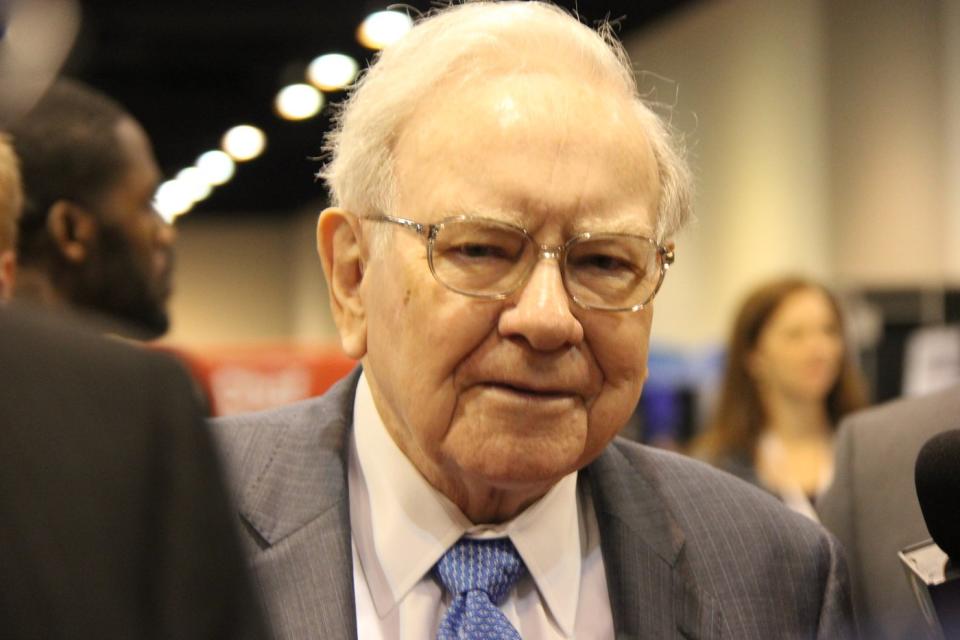Wall Street is a bona fide long-term wealth creator, and few money managers know this better Berkshire Hathaway (NYSE: BRK.A)(NYSE: BRK.B) CEO Warren Buffett. Since taking the reins at Berkshire nearly sixty years ago, the aptly named “Oracle of Omaha” has overseen a total return of 4,913,549% on his company’s Class A shares (BRK.A) and annualized total returns, including dividends paid, practically doubled. from the broad base S&P500.
Warren Buffett’s ‘recipe’ for success is no secret. On numerous occasions he has been more than willing to share the characteristics/attributes he looks for in the companies he invests in. You’ll often find the Oracle of Omaha and his closest investment assistants, Ted Weschler and Todd Combs, adding brand names, proven companies to Berkshire’s portfolio.

But something else worth mentioning is how important portfolio concentration has been to Berkshire Hathaway’s long-term success. The company’s top investment minds, which until his recent death included the great Charlie Munger, have long believed that extra weight should be given to their best ideas.
As of the closing bell on April 12, 2024, 68% ($253.2 billion) of the $372 billion portfolio Warren Buffett oversees at Berkshire Hathaway was invested in just four stocks.
Apple: $159,876,617,000 in market value (42.9% of invested capital)
If there was any doubt that Buffett and his team prefer to bet big on their best investment ideas, look no further than technology stocks Apple (NASDAQ: AAPL). Despite Berkshire Hathway having interests in 45 stocks and two index funds, almost 43% of its invested assets are tied up in Apple.
The Oracle of Omaha’s love for Apple was professed at Berkshire’s annual shareholder meeting last May, where Buffett noted that Apple “is a better company than any company we own.” It’s an especially strong statement considering that his company wholly owns insurer GEICO and railroad BNSF, among about five dozen other companies.
One factor that helps tick all the right boxes for Apple is its top-notch management team. CEO Tim Cook is currently leading Apple’s transformation to a platform-driven business model. While the company isn’t turning its back on the physical products that made it popular with consumers (iPhone, iPad, Mac and Apple Watch), it is simply evolving to focus its efforts on subscription services.
A subscription-based platform should help Apple increase its operating margin over time, smoothing out the sales swings that typically occur during major iPhone upgrade cycles. Furthermore, subscriptions should increase Apple’s already impressive customer loyalty and keep consumers within its ecosystem of products and services.
Perhaps Warren Buffett’s favorite thing about Apple is its unsurpassed capital returns program. Apple pays out $14.8 billion in annual dividends to its shareholders and has repurchased $651 billion of its common stock since starting a buyback program in 2013. These buybacks have steadily increased Berkshire’s ownership stake in the company.
Bank of America: $36,695,773,295 in market value (9.9% of invested assets)
Although Apple accounts for the lion’s share of Berkshire Hathaway’s invested assets, there is no sector that Buffett has historically invested more in than the financial sector. Giant in the field of money bank of America (NYSE: BAC) accounts for nearly 10% of Berkshire’s $372 billion investment portfolio.
What makes bank stocks so attractive to the Oracle of Omaha is their ability to benefit from long-winded periods of growth. The U.S. economy spends a disproportionate amount of time growing compared to contracting, allowing money center banks like BofA to grow their loan portfolios over time and generate more interest income.
But there’s more to Bank of America than just the steady, long-term growth of the U.S. economy. For starters, it is the most interest rate sensitive bank of the largest US banks. Since March 2022, the Federal Reserve has raised interest rates at the fastest pace in four decades. In turn, BofA has seen its net interest income increase by billions of dollars every quarter.
What’s even more impressive is BofA’s efforts to encourage digital banking. Since the end of 2020, consumer household adoption of digital banking has increased by six percentage points to 75%, with nearly half of all loan sales during the quarter ending in December completed online or through a mobile app. As consumers shift their banking habits to digital platforms, Bank of America has the luxury of consolidating some of its physical branches and reducing its costs.
The icing on the cake for Warren Buffett is that Berkshire’s BofA stock generates nearly $992 million in annual dividend income.


American Express: $33,081,454,740 in market value (8.9% of invested capital)
Did I mention that financial stocks are kind of a go-to for the Oracle of Omaha? Leading player in the field of credit services American Express (NYSE:AXP) has been a continuous holding in Berkshire’s portfolio for 33 years and accounts for only 9% of invested assets.
Like Bank of America, AmEx benefits from longer periods of growth. While no U.S. recession since the end of World War II has exceeded the eighteen-month mark, there have been two periods of expansion that exceeded the ten-year mark. These long growth cycles encourage consumers and businesses to spend, which is great news for AmEx.
The company-specific reason American Express has performed well for so long is its willingness to play both sides of the transaction path. On the one hand, it is the third largest payment processor in the US (the world’s largest consumer market) in terms of purchase volume through the credit card network. If the US and world economies prosper, this will generate a lot of fees from traders.
On the other hand, it also acts as a lender. The company’s cardholders may pay annual fees and interest to American Express. While being a lender can expose AmEx to credit delinquencies and potential credit losses during economic downturns, the double dip during long periods of growth makes this dual approach worthwhile.
I’d be remiss if I didn’t also mention that American Express has an uncanny ability to attract high earners. Affluent cardholders are less likely to change their spending habits or default on their bills when inflation rises or a minor recession occurs. In theory, AmEx is better prepared for economic downturns than most credit unions.
Coca-Cola: $23,312,000,000 in market value (6.3% of invested capital)
The fourth top holding in Berkshire Hathaway’s $372 billion portfolio is none other than Warren Buffett’s longest-held stock. Coca-Cola (NYSE:KO). Shares of Coca-Cola have been continuously owned by the Oracle of Omaha company since 1988.
If you want proof that time is an undeniable ally for investors, Coca-Cola is a prime example. Berkshire Hathaway’s cost basis for this beverage giant is approximately $3.2475 per share. But thanks to Coke’s 62 consecutive years of annual base dividend increases, the company now returns $1.94 per share annually to its shareholders. Berkshire’s investment team oversees a 60% annual return over their company’s cost base in Coca-Cola!
Coca-Cola’s long track record of success can be summed up in three factors. First, it’s a consumer staples stock. It provides a basic necessity (beverages) that consumers are going to buy no matter how well or poorly the U.S. or global economy performs. This has led to a very predictable operating cash flow year after year.
Second, Coca-Cola’s geographic diversity is virtually unparalleled. With the exception of North Korea, Cuba and Russia (due to the invasion of Ukraine), Coke has ongoing operations in every other country. It is able to move the organic growth needle thanks to its presence in emerging markets, but provides predictable cash flow in developed countries.
The third catalyst was the excellent marketing efforts. It has shifted a significant portion of its advertising budget to digital channels to reach a younger audience. However, Coca-Cola has a rich history that it can lean on to connect with its adult consumers.
Should You Invest $1,000 in Apple Right Now?
Before you buy shares in Apple, consider this:
The Motley Fool stock advisor The analyst team has just identified what they think is the 10 best stocks for investors to buy now… and Apple wasn’t one of them. The ten stocks that survived the cut could deliver monster returns in the coming years.
Think about when Nvidia created this list on April 15, 2005… if you had $1,000 invested at the time of our recommendation, you would have $514,887!*
Stock Advisor provides investors with an easy-to-follow blueprint for success, including portfolio building guidance, regular analyst updates, and two new stock picks per month. The Stock Advisor is on duty more than quadrupled the return of the S&P 500 since 2002*.
View the 10 stocks »
*Stock Advisor returns April 15, 2024
American Express and Bank of America are advertising partners of The Ascent, a Motley Fool company. Sean Williams has positions at Bank of America. The Motley Fool holds positions in and recommends Apple, Bank of America and Berkshire Hathaway. The Motley Fool has a disclosure policy.
68% of Warren Buffett’s $372 Billion Portfolio Is Invested in Just Four Stocks, originally published by The Motley Fool





